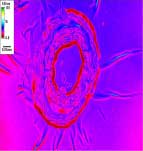 |
|||||||||
|
Research Feature Stories: Other News: |
Transgenic Mice Studies Suggest Effects on Mental Functioning
Neuroendocrinologist Dr. Robert Steiner had already developed a transgenic mouse that overexpressed a neurotransmitter called galanin. He intended to study galanin’s effect on the reproductive system, but also was aware of its overabundance in certain areas of the brains of Alzheimer’s patients. Steiner is a professor in the departments of Obstetrics and Gynecology and Physiology and Biophysics.
While attending a conference, Steiner met Dr. Jacqueline Crawley of the National Institute of Mental Health, an expert on the use of mouse models to study neurological disorders. The conversation resulted in a collaboration that put Steiner’s mice through a series of tests to determine mental function. The results may lead to a better under-standing of why people with Alzheimer’s disease lose their memory.
|
A nerve cell is shown at right. Studies of neurotransmitters and their effects on nerve function may improve the understanding of degenerative neurological disorders, such as Alzheimer's disease. |
 |
The study’s findings, published March 20, 2001, in the Proceedings of the National Academy of Sciences, indicate that galanin appears to play a role in the disease. Steiner’s mice appear to have normal motor and sensory functions, but have problems with difficult tasks that require memory. In one test, for example, mice were required to recall visual cues in a mouse-sized swimming pool to remember the location of an escape platform. The transgenic mice had difficulty remembering the platform’s location. The same difficulty—becoming easily lost—is seen in Alzheimer’s patients. The challenge now is for investigators to figure out how and why.
|
| UW AMC Medical Center | UW School of Medicine | Harborview | UW MC | Search UW AMC | UW Home | Contact Us | ©2001-2002, University of Washington Academic Medical Center. All rights reserved. Please honor our copyrights. |
|